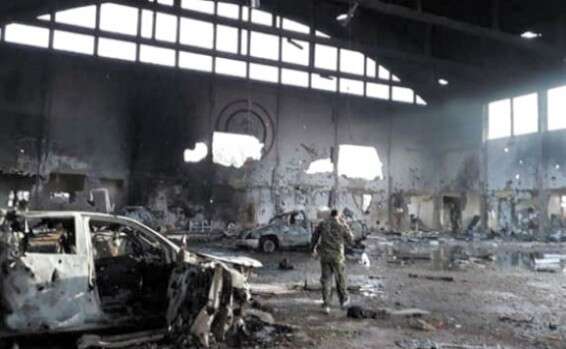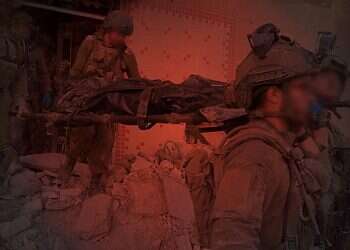The northern sector was bracing itself this week for two scenarios: a possible U.S. strike in retaliation for the chemical attack that killed dozens last weekend in the rebel-held town of Douma in Syria, and potential Iranian reprisal over the alleged Israeli strike on the T4 air base near Homes Monday, which took a serious toll on Iran's efforts to establish itself militarily in Syria and which Syria, Russia and Iran have attributed to the Israeli Air Force.
U.S. President Donald Trump's threat of military action, in a coalition with France and Britain, prompted a slew of Russian warnings that U.S. strikes could trigger a direct military clash between them.
The barbs traded between the two superpowers led Israeli defense officials to place the northern sector on high alert, citing concerns that any clash between the U.S. and Russia on Syrian soil would spill over into Israel.
The two scenarios may appear unrelated but they are, in fact, tightly linked: They attest to the increasing confidence of the Iranian-Syrian axis of evil, which is growing as the Syrian civil war is waning. Under Russian protection – and given the weakness the Americans have displayed so far – Damascus and Tehran feel free to do as they please unopposed, believing the chances that they will be made to pay for their actions are low.
It is too early to say how far the international community is willing to go to punish Syrian President Bashar Assad for the brutal attack in Douma. Previously, in April 2017, the U.S. sufficed with launching 50 Tomahawk cruise missiles at the Shayrat air base in Homs. Syria was dealt a serious blow, but Assad did not learn any lesson. With Russia backing the Syrian regime, including vetoing a U.S. Security Council bid to launch an independent investigation into the Douma attack, it is highly doubtful any lesson will be learned now.
Assad knows that the United States is tired of fighting two wars in the Middle East and that it will not rush to embark on a new campaign, certainly not after its declared goal – defeating the Islamic State group – has been achieved. Europe is also wary of war, certainly as long as it is not directly threatened by terrorist attacks or a torrent of refugees. As usual, the Europeans are misreading the geopolitical map: Refraining from war increases the threat they face, because a Shiite base in Syria could drive out millions of Sunni Muslims, who would flee to Turkey and from there, to Europe.
Time to take action
The only ones to identify the extraordinary opportunity to take actions are, not surprisingly, Israel and the moderate Sunni states, led by Saudi Arabia. The clear understanding in the Middle East is that this is the 11th hour, that something must be done before it is too late – before Assad re-establishes his arsenal of chemical weapons, which he has already proved he has no qualms using, and before Iran fully entrenches itself militarily in Syria, as it has done in Yemen and Lebanon.
So far, however, Israel is also the only one that translates its statements into actions. This week's alleged strike near Homs aside, Israel has taken a series of actions that both illustrate and demonstrate its declared strategy that it will not allow Iran to establish a military presence on the northern border.
Prime Minister Benjamin Netanyahu reiterated his warning to Iran this week, saying its leaders would be wise not to test Israel's determination. Defense Minister Avigdor Lieberman echoed this statement during a visit to the Golan Heights this week, saying, "We will not allow an Iranian presence in Syria, no matter the price. We have no other choice. We will not agree to have an Iranian noose around our neck."
It is doubtful, however, that these warnings will deter Iran.
The first, and so far last, time Israel and Iran traded direct blows was on Feb. 10, when Israel intercepted an Iranian drone incursion into its airspace. Israel retaliated by destroying the drone's control post and two other Iranian assets in Syria, but the IAF lost an F-16 fighter jet in the process and the Middle East came dangerously close to a regional conflagration.
Iran remained silent at the time, using Syrian air defenses to do its bidding opposite Israel.
But this was not the case this week. Iran's Tasnim news agency released images showing the extensive damage to the bombarded T4 air base (Israeli defense analysts believe the raid dealt a major blow to Iran's drone deployment in Syria), the seven Iranian military personnel killed in the strike were extolled in the media, and Iran threatened retaliation.
It is safe to assume that this stems first and foremost from domestic rivalries. The ayatollahs are embroiled in a political power struggle over Iran's activities in Syria, Yemen and elsewhere. The conservatives, Supreme Leader Ali Khamenei and the powerful Revolutionary Guards are leading this international campaign and are willing to invest significant financial and human capital to maintain it. The reformists, led by President Hassan Rouhani, oppose it and demand that the money be invested at home, in the Iranian economy that is reeling from years of crippling sanctions.
The Iranian public mostly supports the reformists, which in turn has backed the conservatives into a corner, forcing them to deliver an explanation, as well as retaliation.
Disconcerting escalation
Iran ostensibly has three avenues of response: The first is to target Israeli assets overseas, such as an embassy; the second is to use its Lebanese proxy, Hezbollah, to attack Israel; and the third is to use the Shiite militias in Syria, or perhaps even the Iranian forces deployed there, to attack Israel.
The likelihood of the first scenario is very low. Iran has a long history of international terrorism, and Israel and the local Jewish community paid a heavy price in 1992 and 1994 in Buenos Aires. But in 2018, terrorist attacks of this nature are the hallmark of Islamic State, and even Iran is wary of having the entire world turn against it. On the other hand, low-intensity retaliation will not serve Tehran's desire to generate deterrence.
The probability of the second scenario is also low. An attack emanating from Lebanon will lead to an Israeli response that could prompt a rapid and broad security escalation, and perhaps even lead to war. It is doubtful that Hezbollah, which is still licking its wounds after years of fighting alongside Assad's forces in Syria, has any interest in such a campaign, and it is doubly doubtful that its Iranian patrons are interested in jeopardizing their huge investment in the Shiite terrorist group to exact revenge on a small scale.
This makes the third scenario the most likely. This may come in the form of another drone incursion, an attempted terrorist attack on the border in the Golan Heights, or rocket fire at Israel.
Israel seems ready for whatever comes, but it must plan several steps ahead and try to foresee the potential fallout and the disturbing potential of clashing with Russia, the chances of which increased significantly this week in light of Moscow's harsh public criticism of Israel as undermining Syria's stability.
An escalation of this nature is troubling, but Israel has clear aerial, intelligence and technological superiority that will deter anyone, certainly Syria, from embarking on military adventures that could topple Assad's regime. The IDF may be fighting on two fronts – in the north and on the Gaza Strip – for the first time since 2006, but as long as things do not turn into an all-out war, the IDF is more than up to the challenge.
The Russian challenge, on the other hand, is far more complex and Israel cannot address it alone. Russia is cynical, self-interested and oblivious to anything but its own objectives. Israel may have demonstrated its determination when it allegedly operated under Russia's nose in T4, but it is unlikely to test the boundaries of Russian patience. That role is reserved for the United States, whose response to the chemical attack in Douma will be largely directed at Russia as well.
The coming days will be critical with regard to Iran and Syria and the future of the northern sphere, but also against Russia and the interreligious and Eastern-Western bloc struggle.
It is far too soon to assess how this struggle will end. The good guys have been given a rare opportunity to act, but Israel must prepare for the possibility that at the end of the day, it will find itself alone in the battle.




